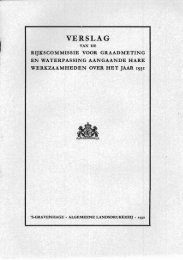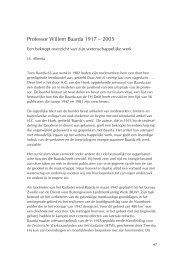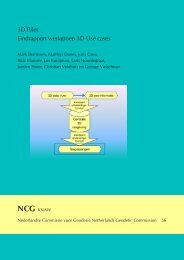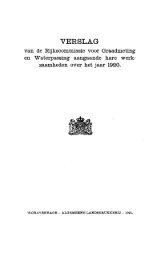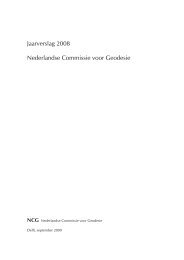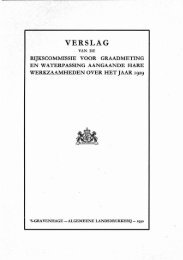SDI Convergence - Nederlandse Commissie voor Geodesie - KNAW
SDI Convergence - Nederlandse Commissie voor Geodesie - KNAW
SDI Convergence - Nederlandse Commissie voor Geodesie - KNAW
You also want an ePaper? Increase the reach of your titles
YUMPU automatically turns print PDFs into web optimized ePapers that Google loves.
The use of location-based information about citizens in public administration, such as<br />
the new road pricing system may affect the meaning of citizenship by shifting the information<br />
and the power relationship between government and citizens. Not only can<br />
LBS increase the governments’ knowledge of who is where at what moment, the underlying<br />
technologies may also instigate the exertion of control of who goes where at<br />
what moment (Dobson and Fisher, 2003). Here, we address the inherent logic of LBSapplications<br />
in the context of Dutch public administration and aim at demonstrating the<br />
importance of the issue of privacy in public places.<br />
In the next section we discuss in more detail the notion of citizenship in the information<br />
age. In the third section we focus on three LBS-applications in Dutch public policy,<br />
each of which are based on different positioning technologies. First, the introduction of<br />
a Radio Frequency Identification (RFID)-based public transport card is considered.<br />
Second, the plans for the new satellite-based road pricing system will be reviewed.<br />
Thirdly, we consider the use of mobile phone location data in crime fighting. We then<br />
present a model of the actors and data streams applying to location-based services in<br />
public administration and use this to reflect on the three cases. In section four of our<br />
contribution we discuss the concept of privacy in public places in relation to LBS as<br />
well as some relevant European case law.<br />
2. CITIZENSHIP IN THE INFORMATION AGE<br />
2.1 Citizens as subjects, clients and citoyens<br />
Several scholars have argued that ICTs have the potential of altering the balance in the<br />
government-citizen relationship. The literature shows three extreme positions, which<br />
each indicate a different direction in which this relationship may evolve as a result of<br />
the ICT-revolution. The first two positions can be found in the Orwell-Athens debate as<br />
set out by Van de Donk and Tops (1992). The authors describe the scenarios of a<br />
powerful, Orwellian state on the one hand and that of democratic Athens-inspired society<br />
on the other. In each scenario different values regarding citizenship are dominant<br />
matching a different role the citizen can fulfil when interacting with government. In the<br />
Orwellian scenario, the citizen is predominantly treated as a subject of the state. Government<br />
has the power to set limitations on the behaviour of citizens and make sure<br />
that they obey the will of the state. The increased transparency of the citizen, caused<br />
by ICT, only helps government in steering and controlling society. Any deviant behaviour<br />
can be detected and acted upon using technological devices. Government thus<br />
uses ICT as a weapon to exercise power over citizens. In the opposing Athens scenario<br />
citizens seem to become more powerful thanks to ICT. They manifest themselves<br />
as citoyens in their relationship with government. In this role, citizens are treated as<br />
partners in the process of public policy making. Their opinions matter and now they can<br />
be consulted more easily than ever before thanks to ICT. The ideal of direct democracy<br />
is realised in Athens. As citoyens citizens have the right to get involved in public matters.<br />
In the Athens scenario, this right becomes reality.<br />
Another debate in e-government literature shows us a third extreme position. Taylor et<br />
al. (2009) distinguish studies of the ‘surveillance state’ and studies of the ‘service<br />
state’. The first type of studies are generally inspired by the fear of an Orwellian state,<br />
we already presented earlier as a first extreme position. The latter add a third perspective,<br />
which Frissen (1998) labelled ‘Soft Sister’. As a Soft Sister, government emphasises<br />
the role of the citizen as a client. Government’s top priority is to provide multiple<br />
and excellent services to its clients. As a client, the citizen expects and demands a<br />
certain service level when interacting with government. ICT opens new ways to cater<br />
76







